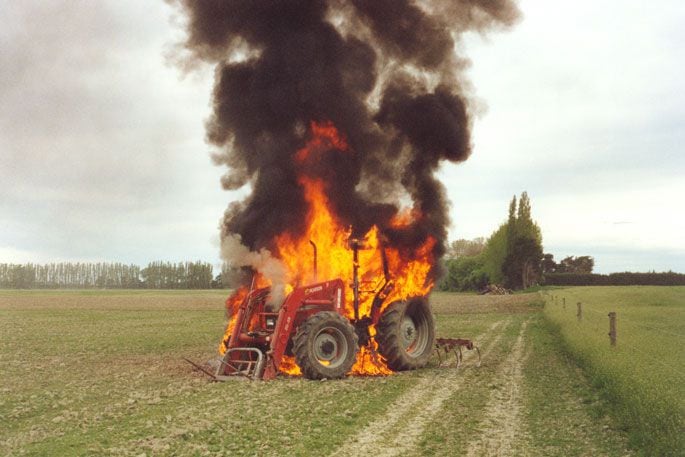While tractor fires are lessening, any is too many, says a veteran firefighter in the Waikato.
Kevin Curtis is in a unique position to offer advice on the issue as a member of the Matamata Volunteer Fire Brigade for almost 50 years and senior loss adjustor with FMG Insurance.
The Matamata brigade’s chief fire officer says farm callouts relating to tractors and machinery have been on the downturn in recent years due to greater awareness and specialist advice.
Kevin says farmers need to remain vigilant to protect their families, staff and property.
Nesting birds
One the biggest causes of tractor fires on farms is bird’s nests, particularly relating to starlings.
He says these birds can build a nest in 10 minutes once a tractor is parked.
“They find a nice warm and dark place — usually around the engine exhaust or turbo — and bring good nesting material.”
Kevin says starlings have the ability to find their way into the smallest of entry points to build their nests.
The best action farmers can take to prevent the problem is to leave engine hoods up when a tractor is stopped for any period of time.
“Starlings love a concealed space to build their nests.”
Engine bays need to be then checked before starting the tractor again, says Kevin.
This is in line with FMG’s long-running Stop & Pop campaign.
Kevin says combine harvesters, quad bikes, side-by-sides, cars and utes are also not immune from a determined bird keen to build a nest.
Resulting fires can be disastrous, with more than a third of tractors that catch alight a complete loss.
He says there is also the potential to lose other machinery in the near vicinity along with associated buildings.
“The end result could be a multimillion-dollar loss.”
From January to June 2024 FMG paid out 39 tractor fire claims, costing $1.3 million, with 31 of these “total losses”.
The company handled five tractor claims a month, a majority of these relating to fires, the biggest at $302,000.
From January 2019 to December 2023, FMG paid out more than $15.5m in tractor fire claims.
Extra vigilance
In his long experience with the fire service, Kevin has been to the scene of farm fires when all that remained was the frames of tractors and sheds.
Remote rural areas may be 20 minutes away from the nearest fire station, so Kevin says it is important to be extra vigilant.
He recommends having fully serviced fire extinguishers in tractors, machinery and buildings.
“There is never such a phrase as too much suppression.”
While it may sound obvious, he says farmers and staff also need to learn how to use extinguishers correctly.
He stresses the need for farmers and contractors to clean tractors, harvesters and any agricultural equipment after use.
High-pressure hoses are good for this, says Kevin. “Crack open the bonnet and clean the engine area. Heavy use of equipment can coat the engine in chaff and grime, a build-up of which can cause the engine to overheat and catch fire.”

Matamata Volunteer Fire Brigade chief fire officer Kevin Curtis. Supplied photo
Kevin says nests in switchboards in farm buildings can also result in a fire causing significant damage and disruption, and potentially loss of life.
As with birds, he says it is important for farmers and their staff to also look out for signs of rats or mice near electrical wiring and remove any nests or other flammable material from switchboards.
“Make sure your switchboards are properly enclosed and have a rodent management plan such as ensuring the building is tidy, investing in traps and bait, and keeping grass/foliage trimmed back from the external walls of the building.”
Helping in advance
If a fire call has to be made, Kevin says farmers can help brigades in advance.
“Make sure they can get the fire truck up to access buildings and machinery.”
This means providing a corridor of at least 4 x 4 metres (width and height) free from overhanging vegetation.
Kevin says the width of farm gateways also needs to be taken into consideration.
If a dwelling is under threat of fire, he says it is vital to have an “escape plan” for all occupants.
This includes a designated meeting area such as the mailbox.
“Once out, don’t go back.”
He says farmers need to be alert to the danger of fire and the fire risk inside and outside their homes and include fire protection in their business plans.
“Fire has the potential to cause losses both inside and outside your home. The consequences can be disastrous.”
He says rural property owners face a higher risk from fire than their urban counterparts.
“The consequences are greater because fires are detected later, and the emergency response takes longer.
“You need to have a higher level of fire safety awareness and to take extra precautions in rural areas.”



0 comments
Leave a Comment
You must be logged in to make a comment.